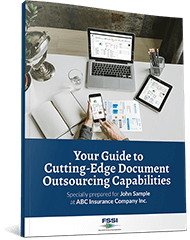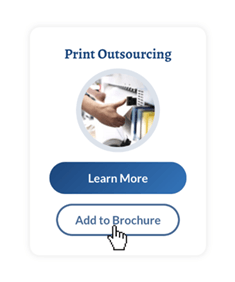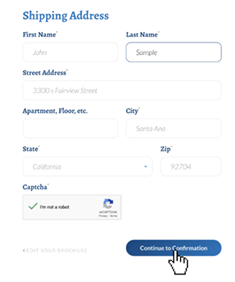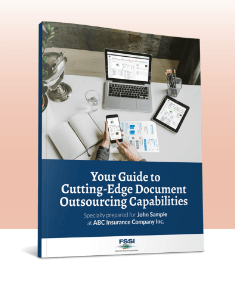Marketing Strategies, Technology and Mobile, Variable Data Personalization
Personalized Marketing: The Road Less Traveled

The Benefits of Personalized Marketing for the Financial Services Industry
Personalized marketing is a form of target marketing that creates messages for individual customers. In many cases, personalization is run through an automated method that uses computer software to mine data and make client-centric recommendations. Marketers then use that data to create relevant messaging. A personalized marketing platform can be used for products by employing preference systems that help consumers select individual specifications on the products they want.
By offering customers the products they want, businesses are more likely to convert targeted website traffic and direct mail campaigns into sales. The transactional nature of the financial services industry can get a little dull. By integrating personalized marketing into your financial statements, bills, invoices, and compliance documents, you can increase the value of each document you send to your customers.
What is Personalized Marketing?
Personalized marketing, also known as one-to-one marketing or individual marketing, refers to the practice of tailoring marketing efforts to address the specific needs, preferences, and characteristics of individual customers. It involves leveraging customer data and insights to create targeted and customized marketing messages, offers, and experiences.
By analyzing demographic information, purchase history, browsing behavior, and other relevant data, businesses can deliver personalized content and recommendations that resonate with each customer on a more personal level.
Goals of Personalized Marketing
- Enhance customer engagement
- Improve customer satisfaction
- Drive conversion rate
- Provide relevant, timely messages aligned with individual interests and preferences
- Build stronger customer relationships
- Increase brand loyalty
Personalized Marketing is not just for eCommerce
Personalization in marketing is no longer limited to e-commerce or online marketing. It extends across various industries and channels, including brick-and-mortar retail, service-based businesses, and traditional print advertising. Understanding the unique characteristics and preferences of individual customers is crucial in creating tailored experiences that resonate with the target audience, whether online or offline.
Brick-and-mortar retailers can personalize the shopping experience by using in-store customer profiling. Sales associates can leverage customer data to provide personalized recommendations and offers, such as remembering previous purchases or communication preferences. This approach enhances customer satisfaction, fosters loyalty, and increases the likelihood of repeat visits.
Even traditional print advertising can leverage personalization through targeted mailing lists. By segmenting the audience based on demographics, geography, or behavior, businesses can create personalized messages and offers. From personalized direct mail campaigns to customized catalogs, print advertising becomes more engaging and relevant, fostering meaningful interactions with customers.
What Type of Customer Responds Best to Personalized Marketing?
- Targeted Marketing sends one message to one customer (1:1)
- Mass marketing involves sending a single message to multiple customers.
- 1 to 1 Marketing and Personalized Communication.
1-to-1 Marketing is more effective because it speaks specifically to and resonates with a prospect. However, the level of customization implemented depends greatly upon the prospect’s or a customer’s available information.
Personalized advertising is most effective for customers who are comfortable with sharing information. Fortunately for businesses, the average consumer is willing to give away a little privacy to achieve a personalized experience. By comparing the total population, younger customers who have experienced technology since the beginning of time are generally more comfortable giving out information than older generations.
How to Create a Personalized Communication Campaign
Personalization in marketing has an impact on various marketing approaches. The following examples demonstrate how personalized marketing communications and variable data printing can be used in each situation:
Business-to-Business (B2B)
Businesses can collect lead intelligence on prospects and the precise challenges they are going through. Marketers then use this information to frame their pitches, instead of contacting decision-makers and agents in their business targets.
Digital Marketing
Businesses can design web pages that display content based on a consumer’s history. For example, when a prospect visits the company’s website, the purchase history, geographic location and referral source can influence what content we present to the visitor. SEM and SEO are now crucial to the success of many businesses.
Social Media Marketing
Businesses respond to clients through social media by engaging with them and answering their questions. Personal interaction proves to be more effective than automated responses. Single clients may require more effort. However, social media marketing increases the chances that customers will share their positive experiences with family and friends. As a result, this connects businesses with more contacts.
Email and Direct Mail
Direct mail advertising combined with personalized marketing strategies allows you to change your lead information. In addition, personalized direct mail also allows you to include or highlight specific offers or products. We refer to this type of technology as variable data printing or variable information printing.
For businesses, personalized communication is the core skill in any direct mail marketing campaign. The goal of a marketer is to create personalized, engaging messages. These messages should communicate a deep understanding of the prospect or customer simply, persuasively and clearly.
Personalization in Marketing is No Longer Optional
Personalization in marketing transcends e-commerce and online channels. It is essential across industries and marketing platforms. By understanding customers’ unique needs and preferences, businesses can deliver tailored experiences that deepen connections and drive better results, whether in-store, in services, or through print advertising. Embracing personalization is crucial for staying competitive and meeting the expectations of today’s consumers.
FSSI is a trusted partner for businesses looking to integrate personalization into their marketing and transactional documents, such as statements, bills, and invoices. With our expertise and advanced technology, we enable businesses to leverage customer data and create personalized communications that resonate with their target audience. By harnessing data-driven insights, businesses can tailor the content, design, and messaging of their documents to meet the unique needs and preferences of each customer.
Whether it’s incorporating personalized offers, relevant product recommendations, or customized messages, FSSI empowers businesses to deliver highly personalized and impactful communications that enhance customer engagement and drive better results. With our seamless integration and automation capabilities, businesses can efficiently execute personalized document campaigns, ensuring that every customer interaction is meaningful, relevant, and contributes to overall business success.
Learn more about how FSSI supports your company’s targeted marketing campaigns.




